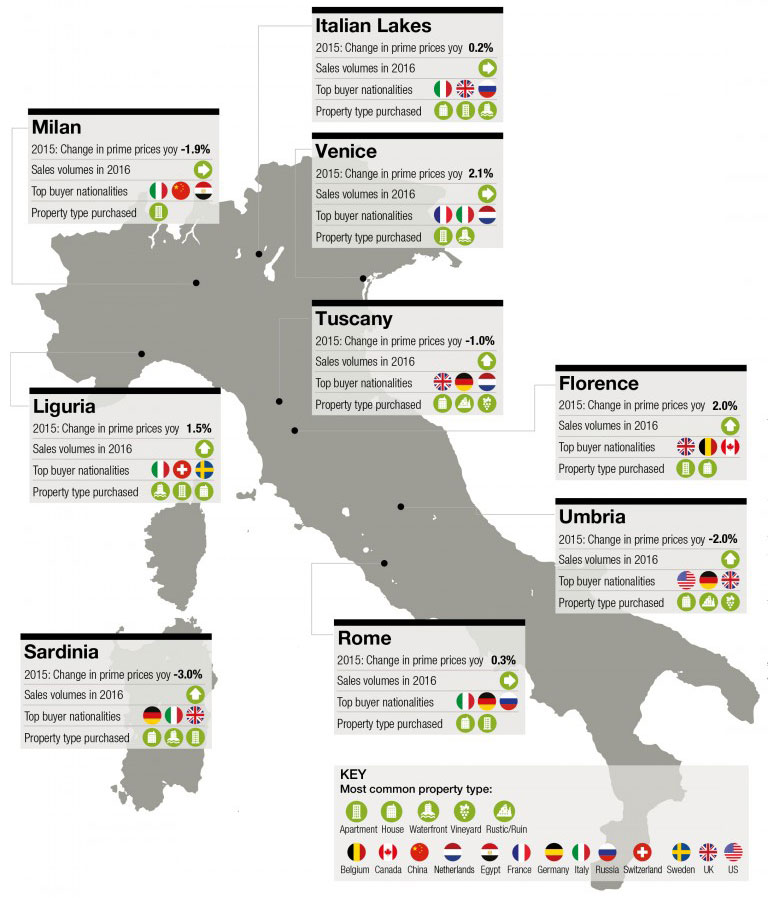Under the Italian government’s bonuses scheme (“Bonus Ristrutturazioni” and “Ecobonus”) homeowners could benefit from a tax deduction of up to 50% on the expenses related to extraordinary maintenance (i.e bathroom makeover, replacement of windows, internal refurbishment including demolition and reconstruction of partitions and replacing plumbing and electrics) and up to 65% on expenses related to energy upgrades (i.e. reduction of energy needs for heating, thermal improvement of the building, installation of solar panels, replacement of winter air conditioning systems) with the obligation of improving the property’s energy efficiency by two ratings, for example from G to E.
Continue reading Home renovation: Government BonusesBrexit & Second Homes in Italy

The UK’s departure from the EU will have consequences for Brits with second homes in Italy, or for those are looking to buy?
The simply answer is NO: unlike other countries in the EU, as France, in Italy there will be no changes for Brits from 1st January 2021.
Taxation on property in Italy is the same for Italians, EU citizens and non-EU citizens. Same easy rules if you buy, maintain or want to sell your property in Italy, no matter your nationality.
Moreover, considering that tax to pay when you buy a re-sale property and to maintain a property (re-sale or newly built) are calculated on the Tax Value “Valore Catastale” that in Liguria is sensible less (60/70% less) than the Commercial Value, the taxes to pay to buy and to maintain a property along the Italian Riviera are so much less than the ones to be paid in other territories, such as in neighboring French Riviera.
Новый налог для состоятельных иностранцев в Италии

Не так давно Правительство Италии, с целью привлечения иностранных инвестиций и капиталов, выступило с инициативой о введении нового фискального режима – единого налога для обеспеченных иностранцев.
Размер единого налога составит 100 000,00 € (или же, около 105 000,00 $) в год, и применяется ко всем видам доходов, полученных за границей иностранцами, декларирующими Италию страной, которую они выбирают в качестве страны своей налоговой резиденции.
Кроме того, для близких родственников, также существует возможность стать налоговыми резидентами Италии, при условии оплаты 25 000,00 €, на каждого из членов семьи заявителя.
В соответствии с законодателсьствтом Республики Италия, единая ставка налогооблажения будет иметь возобнавляую основу максимум на протяжении последующих 15 лет, т.е., данный налоговый режим может автоматически продлен каждый год на протяжении макисмального периода, ограничивающегося 15 годами.
Следует также отметить, что представленные изменения о налогооблажении обеспеченных иностранцев, в целях привлечения зарубежных инвестиций и капиталов в экономику Италии, представлены в Законе от 11/12/2016, №232, также известным, как, “Закон о Бюджете на 2017 год”.
Одним из главных изменений, без соменения, является представление специального режима налогооблажения, в соответствии со ст. 24 Налогового Кодекса. Данный режим направлен, в большей мере, на иностранцев-нерезидентов, которых также называют “HNWI – high net worth individuals”, имеющих своей целью облегчение процедуры получения резиденции в Италии.
Указанный налоговый режим предоставляет заявителям определенные выгоды, включая единоразвую сумму налога (или “заменяемой”), подлежащего уплате (вместо обычной налоговой ставки, в соответствии с общепринятыми правилами и стандартами), относящегося к доходам, полученным заграницей.
Кроме того, в данной статье, помимо прочего, ведется речь, в т.ч., о процедурах запроса визы и получения итальянского вида на жительство, применяемых к тем, кто хочет подать завяление на перемещение в Италию своей налоговой резиденции в соответствии с введенным налоговым режимом.
Заявителем на процедуру предоставления специального режима налогооблажения могут быть граждане любой нациоанальности.
Следует также заметить, что данная практика распространяется на тех граждан, которые не являются резидентами Италии на протяжении последних 9 из 10 финансовых лет на момент подачи заявления на получение такой налоговой льготы. С точки зрения налоговой политики, физлицо считается налоговым резидентом Италии в случае, если оно пребывает на территории страны в течение периода, превышающего 183 дня, или же, 6 месяцев в год.
В дополнение ко всему вышесказанному, нужно добавить, что зявитель должен сделать определенный запрос, в котором речь идет о том, имеет ли он право на получение данного режима налогооблажения. В случае позитивного решения от итальянской налоговой службы, заявитель может воспользоваться одной из опций налогового режима.
Законодательство позволяет налогоплательщику:
1) Воспользоваться опцией в полной мере или же нет;
2) Воспользоваться опцией частично, т.е., применить режим к одному или нескольким источникам дохода и/или территориям их происхождения (ко всем остальным источникам дохода, будет применен обычный режим налогооблажения). Данная опция может быть выбрана заявителем в момент подачи запроса.
Воспользоваться льготным налоговым режимом, введенным правительством Италии, можно будет уже с 1 января 2017 года. Соответственно, он будет иметь отношение уже к индивидуальным налоговым декларациям заполненным в 2017-ом, а не в 2016-ом году. Выбор и использование специального налогового режима должно быть осуществлено до момента исчтечения срока подачи налоговой декларации (на данный момент, этот период составляет до 30 сентября следующего года, по отношению, к тому, в котором была переведена резиденция). С этого года, она считается вступившей в силу.
Необходимо также указать юрисдикцию (-и) последней налоговой резиденции до момента запроса таковой в Республике Италия.
Agenzia delle Entrate (налоговая администрация) передает эту информацию налоговым органам юрисдикции, указанной в качестве последней, до момента действия налогового периода.
Как указано выше, при необходимости, опция данного налогового режима может быть отозвана, однако же, изначально, ее длительность составляет 15 лет от момента подачи соответствующего заявления.
Возможность использования льготного режима налогооблажения для обеспеченных иностранцев-нерезидентов прекращается в случае, если налогоплательщик не может, полностью или частично, осуществить выплату единоразовой суммы налога, в соответствии с действующим законодательством, несмотря на то, что в предыдущих налоговых периодах выплаты могли быть произведенны в полном объеме.
Необходимо также отметить тот факт, что данный режим налогооблажения может быть применен, на время его действия, к одному или нескольким членам семьи, которые также должны будут действовать в соответствии с правилами получения резиденции, описанными выше. Применение может быть отозвано как в отношении одного, так и нескольких членов семьи заявителя.
В отступление от принципов налогооблажения всех доходов, заработанных во всем мире (т.н., “всемирный подход к налогооблажению”), новая ст. 24 бис, представленная в Законе о Бюджете на 2017 год, гласит о:
1) Применении и уплате единоразовой суммы налога (вместо обычной суммы, подлежащей упалте в соответствии с общими правилами);
2) Освобождение от обязательств по налоговому мониторингу;
3) Освобождение от уплаты налога на стоимость недвижимого имущества, находящегося за границей;
4) Освобождение от уплаты налога на финансовые активы, находящиеся за рубежом;
5) Освобождение от уплаты налога на наследство и пожертвования, на имущества и права на них, существующие за границей в момент правопреемства или пожертвования.
Специальный фискальный режим предусматривает применение заменительного налога. Данный налог, влияет на доходы, полученные за рубежом, и определяется, в отсутствие конвенции против двойного налогообложения на основании:
1) Дохода от земли
2) Дохода на инвестиции
3) Налога от занятости
4) Дохода от самостозанятости;
5) Дохода от предпринимательской деятельности;
6) Другого вида доходов.
Из вышеуказанного списка, доходы от прироста капитала, полученные путем реализации квалифицированных долей в период первых пяти лет действия режима, налогом не облагаются. Для данных доходов, применяется обычный налоговый режим.
Заменительный налог рачитывается в независимости от полученных сумм и составляет фиксированную сумму в размере 100 000,00 € для каждого налогвого периода в течение периода действия режима.
В случае применения режима членами семьи заявителя, заменительный налог составит 25 000,00 € из расчета на каждый налоговый период на каждого из членов.
Данный налог должен быть уплачен единоразовой суммой не позднее даты истечения срока, предназначенного для его выплаты, т.е., в июне следующего года.
В заключении, следует провести оценку того, не будет ли, в конечном итоге, ввденный налоговый режим для богатых иностранцев-нерезидентов – заменительный налог, выше, по сравнению с обычным налогообложением. Или же, наоборот, ниже существущей стандартной практики.
Дав ответ на поставленный вопрос, налогоплательщик сможет понять является ли такой режим действительно выгодным для него.
Для получения дополнительной информации:
Павел Коровин
pavel@liguriahomes.com
+39 328 196 93 18
New Flat Tax for wealthy foreigners

Italy recently introduced a flat tax for wealthy foreigners in order to attract foreign investors and foreign capitals. The new flat rate tax of 100,000 euro ($105,000) a year will apply to all worldwide income for foreigners who declare Italy to be their residency for tax purposes.
An additional 25,000 euros per person would also be added to the tax rate of those who set up Italian residency for close family members.
According to Italian tax authorities, the flat tax would be renewable every year for a maximum of 15 years.
Going into details, the Law 11 December 2016, no. 232 (“2017 Budget Law“) introduced some important changes about non-resident income taxation in order to attract foreign investors and foreign capitals.
The most important of them is surely the introduction of a special fiscal regime in the Income Tax Code, under article 24-bis. This optional regime is aimed at non-residents, mainly defined “high net worth individuals”, with the intention to facilitate their transfer of residency in Italy. This new fiscal regime provides a series of fiscal benefits, introducing a lump-sum (or “substitute”) tax to pay (in place of the ordinary amount to pay, in accordance with the general rules) related to the possession of foreign income.
Furthermore, the same article 24-bis provides also benefits about the processing requests for visa and residence permit applicable to who wants transfer own fiscal residency in Italy in accordance with this new regime.
The recipients of this new tax provision are individuals, who transfers their own fiscal residency in Italy, regardless of their nationality (Italian or Foreign).
To be taxed under this new special regime, the individual must not have been resident in Italy at least for nine of ten years before the start of period in which he applies for the fiscal advantage. For tax purposes a person is considered an Italian resident for tax purposes if he is in the country for more than 183 days, or six months, in a year.
In addition to the residence requirement set out above, the individual must apply for a specific ruling by which he asks if he is entitled to get this beneficial regime. If the person has a positive response from the tax revenue office, he may exercise the option of the special regime.
The law allows the taxpayer to choose if:
1) to exercise the option or not;
2) to exercise just on some incomes of one or more State or foreign territories (for the other incomes, it will be applied the ordinary regime of taxation). This latter choice must be indicated at the moment of the declaration to opt for the new regime.
This new regulation allow individuals to opt for this tax regime, starting from the current tax period at 1st of January 2017: so, it will concern the individual income tax returns about 2017 incomes, and not for 2016. The option must be exercised no later than the expiry of the presentation of the tax return related to the tax year in which the residency has been transferred in Italy (currently, the expiry would be no later than 30 of September of the year next to that in which the residency has been transferred). From that year, the option becomes effective.
In the option, it is necessary also indicate the jurisdiction or jurisdictions of the last fiscal residency before the exercise of validity of the option.
The Agenzia delle Entrate (the fiscal administration) transmits these informations to the fiscal authorities of jurisdictions, indicated as place of last fiscal residency, before the tax period for which the option is effective.
As anticipated above, the option can be revoked, but its natural duration is fifteen years from the first period of validity.
The effects of the option cease in every case, if the taxpayer omits to pay, entirely or in part, the lump-sum tax in compliance with the current law, without prejudice to the effects produced in the previous tax periods. In case of revoke or the natural decay, the taxpayer will not be entitled to request again the exercise of the option.
The same Law provides that the special regime can be extended, during all the period of validity, to one or more family component, that must respect the admission requirements described above about the residency. The extension can be revoked related to one or more family components.
In derogation from the principle of taxation of all incomes earned anywhere (so-called “world wide taxation principle”) the new article 24bis, introduced by the 2017 Budget Law, provides:
– application and payment of a lump-sum tax (in place of the ordinary amount to pay, in accordance with the general rules);
– exemption from the tax monitoring obligations;
– exemption from the payment of the tax on the real estate value located abroad;
– exemption from the payment of the tax on the financial activities located abroad;
– exemption from the payment of tax on inheritance and donation taxes, for the properties and rights on them existing abroad at the moment of succession or donation.
The special fiscal regime provides the application of a substitute tax. This tax affects the income produced abroad, identified, in absence of a convention against the double fiscal impositions:
1. Income from land;
2. Investment income;
3. Income from employment;
4. Self-employment income;
5. Business Income;
6. Other kind of income.
From the above list, the capital gains through the sale of qualified participations realized in the first five tax periods for which the option is effective, are excluded by this new regime. For those incomes it is applicable the ordinary fiscal regime.
The substitutive tax is calculated, regardless of the amount of income received, at a lump sum of € 100.000 per each tax period during which is valid the option.
In the case of the extension for the family component, the substitutive tax is equal to € 25.000 per each tax period, during which is valid the extension, and per person.
The substitutive tax must be paid in one solution no later than the expiry provided for the payment of the balance of the income taxes, which is on June of the following year.
If the person choose to use the fiscal benefit related for just some determinate foreign incomes, which are communicated at the moment of the request of exercise, for the others it will be
applied the ordinary fiscal regime.
In conclusion, it is important to assess if the substitute tax is higher than the taxes, which would be paid under the application of the ordinary fiscal regime, or would be minor: answered this
question, the taxpayer will be able to understand if this new fiscal taxation is convenient (as in this latter case) or not.
After these considerations, it is necessary to control if this particular taxation discussed above is applicable or not, considering eventual consequences, to the specific case.
Please feel free to contact us to receive more information from our partner, specialized in tax, partnership and corporate consulting.
Недвижимость за рубежом
Недвижимость за рубежом – вопрос, который всегда являлся актуальным.
Будь то зарубежная недвижимость с целью переезда или же для осуществления вложений, в первую очередь, в виде инвестиций в зарубежную недвижимость и получения в будущем дохода от сдачи в аренду.
Италия, с точки зрения инвестиций в недвижимость за рубежом, благодрая своей древней и богатой истории, всегда считалась одной из наиболее привлекательных стран во всем мире.
Всемирно известный факт о том, что 155 мирового наследия ЮНЕСКО, расположены именно на ее территории.
Времена Римской Империи, Эпохи Возрождения и, конечно же, Нового времени – безусловно наложили свой отпечаток на архитектуру и дизайн и неповторимый стиль оформления объектов недвижмости.
Если Вы ищете недвижимость за рубежом с целью инвестирования или же приобретения для личного проживания – свяжитесь с нами по имейлу: pavel@liguriahomes.com или же по телефону: +39 328 196 93 18 и мы в кратчайшие сроки предоставим Вам ответы на все интересующие вопросы.
Для того, чтобы посмотреть имеющуюся в наличии недвижимость за рубежом, Италия, – перейдите на наш сайт по линку
Italian Market Overview
Italy’s residential market has turned a corner with viewings, prices and sales all increasing in 2015. Confidence is returning to the market but accurate pricing and realistic wish lists are a must for vendors and buyers.

Prices
According to the Italian Statistics Office, 2015 marked a turning point for residential prices with price growth re-entering positive territory. Prime prices, having softened for several years, are following a similar trend. Across Knight Frank’s nine prime second-home markets, price performance has converged with annual growth ranging from 2.1% (Venice) to -3% (Sardinia) in 2015.
Although double digit annual price falls are firmly in the past we do not expect luxury prices to increase rapidly. Accurate, sensible pricing by vendors remains critical, particularly given the volume of properties available.
Sales
Market confidence is strengthening, residential sales increased by 7% in 2015 and Italy’s consumer confidence index is up 39% since its low in 2012. With properties now competitively priced and the choice of properties at its best for several years those buyers with access to cheap finance and those foreign buyers, able to take advantage of the favourable exchange rate, are deciding to act.
In 2016 we expect sales activity to strengthen in five of our prime markets (Tuscany, Florence, Umbria, Liguria and Sardinia) and to stay broadly stable in the remaining four.
Demand
In 2015 enquiries from buyers looking for an Italian property jumped 57% year-on-year. Tuscany continues to generate the most interest but Liguria and the Italian Lakes (from Como to Maggiore) are increasingly on buyers’ radar.
Italy attracts interest on a global scale. In 2015, some 171 nationalities searched for Italian properties on Knight Frank’s website with British, Italian, US and German buyers remaining the most active in the prime segment.
Buyers look to be taking advantage of current stock levels. The average number of property viewings undertaken per buyer rose from 2.1 in 2014 to 2.5 in 2015.
Currency
In the last two years, the euro has slipped from 0.83 to 0.73 against the pound and from 1.38 to 1.09 against the dollar providing British and US buyers with a strong buying opportunity in Italy.
Taking account of currency movements only this means a British buyer purchasing a €1m property will have seen a 12% reduction in price (or £98,000 in real terms) whilst a US buyer would have seen a saving of 21% (or $288,000). With QE stimulus still in place across the Eurozone and the dollar likely to strengthen in 2016 on the back of the Federal Reserve’s rate rise we expect foreign buyers to continue to benefit
during 2016.
To download the complete Report please click here: “Inside View” by Knight Frank

